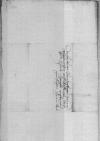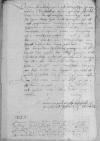List #4345
Ioannes DANTISCUS do Gdańsk Town CouncilLöbau (Lubawa), 1537-10-19
| odebrano Gdańsk (Danzig) Rękopiśmienne podstawy źródłowe:
| ||||
Tekst + aparat krytyczny + komentarz Zwykły tekst Tekst + komentarz Tekst + aparat krytyczny
Den ersamen, namhafftigen herrn(n)
Unsernn freuntlichen grus und alles guthen zuvoran. / Ersame, namhafftige hernn(n), gunstige freunde. /
Nach dem dan uff vleissige, demuetige bytt dÿ hern
Datum(m) auss unserm slos


 APG 300, 53, 249, p. 130
APG 300, 53, 249, p. 130